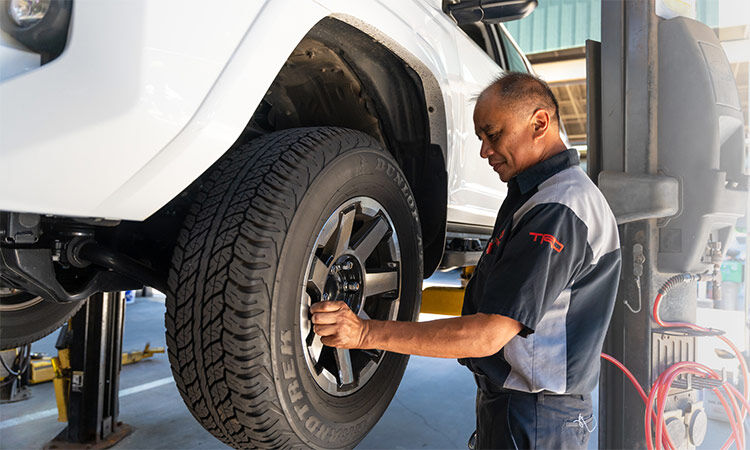Morris Tires: Where GMC Tire Service Meets Quality
Morris Tires: Where GMC Tire Service Meets Quality
Blog Article
Tire Service: The Effect of Weather Condition Problems
When it comes to ensuring optimum performance and safety on the road, comprehending the influence of climate problems on tire service is crucial. GMC Tire Service. In this conversation, we will discover the intricate partnership between weather condition conditions and tire service, dropping light on the relevance of weather-specific tire upkeep methods and factors to consider.
Warmth and Tire Efficiency
When exposed to heats, tires experience adjustments in efficiency that can significantly influence car security and handling. The heat created from prolonged driving or hot climate problems creates the tire rubber to soften, resulting in decreased walk life and enhanced wear. As the rubber comes to be softer, the tire's grip when traveling diminishes, influencing braking ranges and total grip. In extreme cases, excessive heat can even create tire blowouts, posturing a serious safety threat to the car and its owners.

Cold Weather Condition Effects
Winter conditions can have a considerable effect on tire efficiency and safety. As temperatures decrease, tire rubber can solidify, leading to decreased traction on icy or snow-covered roadways. In winter, tires may likewise lose air stress much more swiftly, which can influence taking care of and fuel efficiency. Additionally, chilly temperature levels can cause tire sidewalls to stiffen, increasing the threat of damage from potholes or various other roadway hazards.
To alleviate the results of winter on tires, it is important to regularly inspect tire pressure and inflate them to the manufacturer's recommended levels. Using winter season or all-season tires made for chilly weather condition problems can also boost grip and hold on icy or snowy roads. Correct tire maintenance, including routine assessments for wear and damages, becomes much more essential throughout colder months to ensure ideal efficiency and safety and security.
Rainy Issues Effect
Tires with worn-out footsteps are much more prone to hydroplaning, where a layer of water develops up in between the tire and the road surface, leading to loss of traction. To fight this, chauffeurs must routinely examine their tires for sufficient walk deepness and take into consideration investing in tires especially developed for wet conditions.
Additionally, stormy weather can additionally reduce presence, making it challenging for motorists to see the road ahead clearly (GMC Tire Service). In such problems, it is important to change driving speeds accordingly and keep a risk-free adhering to distance to permit for abrupt stops. Correctly filled with air tires can additionally help in preserving control on wet roadways by offering far better handling and hold
Snow and Tire Safety
When driving in snowy conditions, having the best tires can make a substantial distinction in safety and performance. Wintertime tires are made with unique rubber substances and walk patterns to offer far better grip on snow and ice compared to all-season tires.
Additionally, drivers must consider mounting tire chains in extreme snowy conditions. Tire chains give extra grip by clutching the snow and ice, improving stability and control. It is essential to adhere to producer instructions when mounting and making use of tire chains to prevent damage to the tires and automobile (GMC Tire Service). By picking the best tires, keeping correct rising cost of living, and taking into consideration additional grip aids like tire chains, motorists can improve their security when navigating snow-covered roadways.
Weather-Related Tire Upkeep
Weather-related tire upkeep includes a range of techniques aimed at making sure ideal tire function and longevity in various climate situations. One key element of weather-related tire maintenance is tire stress law. Checking tire step regularly and changing tires when walk wear reaches a particular depth is important for maintaining traction and stability in damaging weather condition.
Conclusion
In verdict, weather problems have a considerable effect on tire efficiency and safety. From heat impacting tire stress and wear to chilly weather lowering grip, it is crucial to consider the weather condition when keeping and utilizing tires.
In this conversation, we will certainly explore the complex partnership between weather problems and tire service, dropping light on the relevance of weather-specific tire upkeep methods and factors to consider.

Report this page